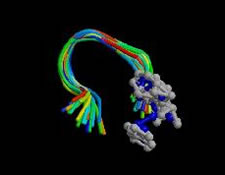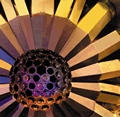| |
|
Today
All Day
State Energy Advisory Board
meeting
Building 90-3148
8 a.m. – 4:40 p.m
Workshop on National
Laboratories and Universities
Building 66 auditorium
9 a.m. – noon
EHS 280
Laser Safety
Building 51-201
CANCELLED:
1:30 – 3 p.m.
EHS 135
Earthquake/Wildland Fire Safety
Building 48-109
7:30 – 9 p.m.
Public Lecture
Norman E. Borlaug
145 Dwinelle Hall, UC Berkeley
Tomorrow
9 – noon
EHS 225
Forklift Training
Building 51-201
9:30 – 11:30 a.m.
Computing Sciences summer student seminars: Tour of the
NERSC Center, Oakland Scientific Facility.
Building 65 shuttle bus stop.
|
|
| |
| |
Market Carvery: Roasted Chicken Gratin
Potatoes & Vegetables
Fresh Grille: Top Sirloin Steak Sandwich,
Fries or Onion Rings
Origins:
Sushi, Sushi, Sushi
|
| B'fast: |
6:30 a.m. - 9:30 a.m. |
| Lunch: |
11 a.m. - 1:30 p.m. |
| Full
Menu |
|
|
|
 |
 |
|
|
|
 |
 |
|
|
NMR-produced
protein structure
(courtesy Wemmer Group) |
|
|
|
NIH
Funds Powerful Magnet for Protein Studies
By
Bob Sanders
The National
Institutes of Health awarded UC Berkeley nearly $6 million
this week to purchase the most powerful magnet available
today for studying protein structure and to push its
limits in discovering the structure and dynamics of
biomolecules. The five-year, $5.9 million grant will
be run by researchers who are part of the California
Institute for Quantitative Biomedical Research (QB3).
QB3, a collaboration between UC Berkeley, UC San Francisco
and UC Santa Cruz, is one of four California Institutes
for Science and Innovation (Cal-ISI) created in 2000
at the University of California through a partnership
of state and industry support. "One of the central
themes in QB3 is using structural biology to understand
how biological molecules - proteins, nucleic acids and
carbohydrates - carry out their function," said
project leader David Wemmer, UC Berkeley professor
of chemistry and a faculty scientist at Berkeley Lab.
" Full
story.
|
| |
|
State
Energy Board Picks Lab for Meeting
The
State Energy Advisory Board, a national group
with a statutory responsibility to advise the
Department of Energy’s Energy Efficiency
and Renewable Energy program on matters affecting
the states, will meet at Berkeley Lab today and
tomorrow. The organization
is made up of about 30 state energy office directors,
local weatherization program coordinators, academics,
and consultants. The Lab’s Environmental
Energy Technologies Division will be the host
in Building 90. The California Energy Commission
will also be participating in the agenda.
|
| |
|
|
 |
|
|
Take
Tour, Find Out
What’s in Stores
Tours
of the Central Storeroom, where
many of the Laboratory’s
main supplies are available for
purchase, can be arranged by calling
7881. The tour program is part
of Stores’ current efforts
to be as accessible as possible
to people at the Lab, including
establishing a more flexible new
set of daily hours (7 a.m. to
3:30 p.m.). Stores customers should
contact Don Prestella at
[email protected],
or call 4224 for any questions
or comments. Stores orders may
be placed by direct purchase at
Building 78 (behind the Facilities
craft shops), via the on-line
Stores site,
by telephone at 5087, or by FAX
at 4211. |
| |
|
 |
|
|
Fire
Season Heats Up
In the East Bay
While
it may be hard to fathom on foggy
summer days, Berkeley Lab sits in
a fire-prone area. Lab property has
been overrun by fire in the past,
and the Tunnel Fire in the Oakland-Berkeley
Hills in October 1991 came close.
With the fire fuel load very high
this year, the Lab’s program
to manage onsite vegetation is in
full swing. Information about the
vegetation management program, links
to local fire resources, and the Fire
Evacuation streaming video "May
I have Your Attention, Please"
are available here.
Enter your LDAP name and password,
and click on "wildland fires"
in the index.
|
|
|
|
|
|
|
|
|
 |
| |
|
The
Hulk:
Fact vs. Fiction
By
Stefan Lovgren
for National Geographic News
|
|
 |
 |
|
|
A
few years ago, the filmmakers behind The
Hulk began surfing the Internet in search
of some real-life science to update the
classic comic book story about a shy scientist
who transforms into a raging beast. On the
Web site for Lawrence Berkeley National
Laboratory, they found what they were looking
for: the Gamma Sphere. "The Gamma Sphere
in the movie is very realistic and looks
the same as the real one," said I-Yang
Lee, who heads Berkeley's nuclear physics
program. "But there's one big difference.
Our Gamma Sphere doesn't emit radiation,
it detects it." OK, so there may not
be a real gamma ray machine that occasionally
zaps poor scientists and turns them into
giant green monsters. But the science behind
Hollywood movies is turning increasingly
sophisticated. As audiences grow more science
savvy—there are even Web sites rating
movies based on the plausibility of movie
physics—filmmakers strive to make their
movies as scientifically realistic as possible.
Full
story.
|
| |
|
|
|
| |
|
|
 |
|
 |
| |
|

